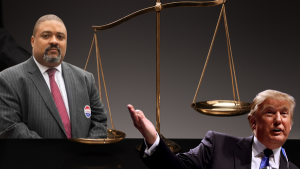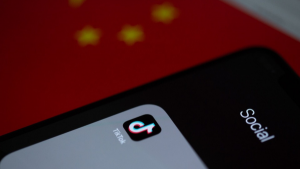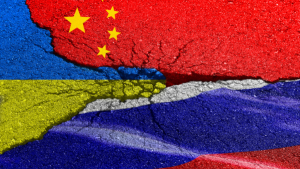The United States is courting tyranny as it drifts away from the rule of law and its international power is undermined by China.
SUBSCRIBE to Life, Liberty & Property. (It’s free.) Read previous issues.
IN THIS ISSUE:
- Courting Tyranny
- New Danger from TikTok: the RESTRICT Act
- Bipolar Vortex
- Murder on the Snowflake Express
- Cartoon
Courting Tyranny

The Donald Trump indictment arrives as a shock but no surprise. The United States has been drifting away from the rule of law and equality before the law for more than a century, and our legal system has been hurtling toward a waterfall in the past three decades.
Our enjoyment of everything we value—everything—depends on the rule of law and equality before the law. Without that, there is no justice, prosperity, or human dignity.
Sources: Blaze Media; Britannica.com; Federal Reserve Bank of St. Louis
New Danger from TikTok: the RESTRICT Act

Sentiment is rising for a ban on TikTok, especially among the nation’s elites. The latter fact should give the rest of us grave reason to pause and think.
The main bill under consideration in Congress, the RESTRICT Act, is an overly broad grant of powers to the executive branch that would effectively give the president and the administrative state the power to “deter, disrupt, prevent, prohibit, and mitigate transactions” far beyond TikTok.
“I think the White House is very in favor of this bill,” The Guardian quotes the bill’s sponsor, Sen. Mark Warner (D-VA), as saying. Warner is the chair of the Senate’s Select Committee on Intelligence.
As Robby Soave writes at Reason,
The Restrict Act, a bipartisan bill that would authorize the Commerce Department to take action against TikTok also empowers it to “deter, disrupt, prevent, prohibit, and mitigate transactions involving information and communications technology products in which any foreign adversary has any interest and poses undue or unacceptable risk to national security.” The bill is supported by the Biden administration.
The concern about this power potentially being abused by the federal government is well-founded, given the expansive way the Biden administration has interpreted countless laws and made up new ones altogether, as in President Joe Biden’s student loan forgiveness schemes. This is a temptation for all presidents, and it is particularly dangerous in a law affecting the freedoms of speech and the press. Soave sums up the peril well:
[T]he Biden administration’s FBI has taken the position that American social media companies were infiltrated by Russian bots and that companies like Twitter are failing democracy by refusing to censor even more content. Mainstream media outlets and a coalition of government-supported think tanks have incorrectly accused social media platforms of being little more than useful idiots for Russian-backed disinformation campaigns.
Should we expect the veritable army of federal bureaucrats obsessed with policing speech on social media platforms to narrowly utilize this new mandate to deter foreign threats and focus solely on the CCP? Or should we anticipate that every weapon added to their arsenal is a threat to the free speech rights of everyday Americans?
I cannot imagine that Twitter would last long under the RESTRICT Act. Perhaps that is the bill’s main purpose.
There are, of course, safeguards built into the legislation, but they will be easily breached by the sort of reinterpretation in which presidents routinely engage. As J. D. Tucccille writes, also in Reason, the RESTRICT Act is “broad legislation that threatens to affect much more than one app,” and I am sure that it will be used as a political weapon, despite its proponents’ claims:
“Under the terms of the bill, someone must be engaged in ‘sabotage or subversion’ of communications technology in the U.S., causing ‘catastrophic effects on U.S. critical infrastructure, or ‘interfering in, or altering the result’ of a federal election in order for criminal penalties to apply,” Rachel Cohen, Warner’s communications director, insists.
Maybe, but those terms are open to definition. Chances are that ambitious prosecutors will, as always, test the boundaries of the law and some unfortunate souls will be forced to run the federal gantlet.
If you have any doubts about that, ask former president Donald Trump and the multitude of other people who have been railroaded by politically motivated, power-hungry prosecutors.
The reference to “interfering in” elections is particularly ominous. It means that a sitting president will be able to use claims of “misinformation” to shut down sites and apps that allow speech critical of the president or the executive’s preferred successor. The sort of speech control that happened in 2020 will be directed from the White House instead of Silicon Valley. There will be no escape.
Giving the administrative state this power would be unconstitutional and tyrannical.
It is also entirely unnecessary, as there is an alternative available that applies specifically to TikTok.
In January, Sen. Josh Hawley (R-MO) introduced the No TikTok on United States Devices Act, a follow-up to last year’s successful enactment of Hawley’s No TikTok on Government Devices Act which bans federal employees from using the app on government devices.
Hawley’s current bill would authorize the president “to block and prohibit all transactions in all property and interests in property of” TikTok, specifically defining the app and any successors or replacements as the sole target of the legislation:
(1) ByteDance Limited, or any successor entity to ByteDance Limited, if ByteDance Limited or the successor entity—
(A) is involved in matters relating to the social networking service TikTok, or any successor service; or
(B) is involved in matters relating to any information, videos, or data associated with such service; or
(2) any entity owned by ByteDance Limited or the successor entity that—
(A) is involved in matters relating to the social networking service TikTok, or any successor service; or
(B) is involved in matters relating to any information, videos, or data associated with such service
A sufficiently unscrupulous and inventive president could probably abuse the power granted n Hawley’s bill, but there is no way of limiting that in any law, other than through the Supreme Court, the press, the states, and the people. The RESTRICT ACT, by contrast, invites such administrative perversion and sets the stage for the establishment of a repressive, authoritarian, one-party state.
Sources: Reason; Reason; No TikTok on United States Devices Act
Bipolar Vortex

At the outset of the Ukraine war, it appeared to me that the one party that stood to benefit most was China. In fact, I suspected that Beijing might well have encouraged Russian president Vladimir Putin to invade Ukraine, with the Chinese expecting to benefit from an inevitable conflict between Europe and the United States on one side and Russia on the other. China would get more Russian oil, and at a lower price because Western sanctions would greatly reduce Russia’s bargaining power.
Regardless of whether that was Beijing’s plan, China is certainly benefiting from the West’s moralistic and simultaneously ham-fisted and halfhearted response to the Russia-Ukraine war. In distinct contrast with what our governments and media told us to expect, the world has not aligned in universal opposition to Russia, harsh words notwithstanding.
On the contrary, a bipolar world is emerging, with largely resource-consuming nations on one side and resource-producing places on the other. The United States, Europe, Japan, and a few other countries are the consumers, and the BRICS nations—Brazil, Russia, India, China, and South Africa—are leading the coalescence of producer nations into a global power alliance. Financial analyst John Rubino reports on his Substack page:
Whether due to the pandemic’s supply chain disruptions, heavy-handed sanctions imposed by US-led NATO during the Russia-Ukraine war, or just the fact that de-dollarization was an idea whose time had finally come, the BRICS alliance has suddenly become the hottest ticket in town. In just the past year, Argentina, Indonesia, Saudi Arabia, Iran, Mexico, Turkey, the United Arab Emirates (UAE), and Egypt have either applied to join or expressed an interest in doing so. And new bilateral trade deals that bypass the dollar are being discussed all over the place.
Combine the land mass, population, and natural resources of the BRICS countries with those of the potential new members and the result is more or less half the world.
Saudi Arabia has just announced that it will join an economic, political, and security bloc led by China and Russia, and other Middle East nations are likely to follow, ZeroHedge reports:
Saudi Arabia will join the Shanghai Cooperation Organization with the initial status of a “dialogue partner.” Formed in 2001, the SCO’s full members are China, Russia, India, Pakistan, Kazakhstan, Kyrgyzstan, Tajikistan and Uzbekistan.
Iran is expected to become a full member later this year, while other dialogue partners include two more countries that have traditionally been in the U.S. sphere of influence: Qatar and Egypt.
China is emerging as the undisputed leader of this developing alliance. Beijing has been working with Saudi Arabia, Iran, and Syria to iron out differences between them, which may encourage them to supply China with more oil—leaving less for Europe. That will have the additional benefit, in Beijing’s view, of further eroding Europe’s economy and geopolitical power. If Europe cannot get oil from the BRICs, there are not many alternatives other than windmills and nuclear. With much of the continent moving away from nuclear power, Europe is voluntarily turning back its technological clock to the 18th century. That is certainly not a path to geopolitical power.
India, meanwhile, is buying more oil from Russia, which has become the subcontinent’s largest source of oil imports, according to Rubino. The Biden administration has declared itself powerless to do anything about it, asking only that India not use Western tankers or insurance companies in obtaining Russian oil. Those are some powerful sanctions. India will pay with rupees, reducing the use of the dollar as an international reserve currency.
In addition to all that, Brazil and Argentina are creating a common currency for trade between the two nations, another case of “de-dollarization.” Even more significantly, Brazil and China will now bypass the dollar in their transactions. ZeroHedge reports:
According to the Brazilian government, China and Brazil have reached a deal to trade in their own currencies, ditching the United States dollar as an intermediary entirely, AFP reported.
The deal, Beijing’s latest salvo against the almighty greenback, will enable China, the top rival to US economic hegemony, and Brazil, the biggest economy in Latin America, to conduct their massive trade which amounts to $150 billion per year, and financial transactions directly, exchanging yuan for reais and vice versa instead of going through the US dollar. In doing so China extends its bilateral, USD-exempting currency arrangements beyond countries such as Russia, Pakistan and Saudi Arabia to now include the Latin American exporting powerhouse. …
China is Brazil’s biggest trading partner, with a record US$150.5 billion (S$200 billion) in bilateral trade last year.
The decline in the use of the U.S. dollar as the world’s primary reserve currency—money that countries all around the world use to make international transactions and investments—will greatly reduce the demand for dollars and erode U.S. power. It will have several knock-on effects in the United States, Rubino notes:
-
- If the BRICS have the commodities and the US and its allies are left with finance, pricing power for crucial things like oil and gold will shift to Russia, China, and the Middle East.
- Falling demand for dollar-denominated bonds as reserve assets will send trillions of dollars now outside the US back home, raising domestic prices (which is to say lowering the dollar’s purchasing power and exchange rate).
- The loss of its weaponized reserve currency will lessen the US’ ability to impose its will on the rest of the world (witness China as Middle-East peacemaker and India buying Russian oil with rupees).
These outcomes, especially the first two, will create financial instability and enormous pressure for price inflation in the United States. If we manage to avoid a nuclear war in Ukraine, it appears that the United States will nonetheless suffer severe and lasting economic damage from our decision to drive Russia into the arms of the Chinese and encourage the BRICs to expand into a global power led by Beijing.
Sources: John Rubino Substack; ZeroHedge; ZeroHedge
Murder on the Snowflake Express

The censors came after Ian Fleming, author of the James Bond books. Then, Roald Dahl, writer of clever tales for children and stylish, cheeky fiction for adults. Now: Agatha Christie, one of the most popular authors of all time, is on the chopping block.
The Telegraph reports:
Digital versions of new editions seen by The Telegraph include scores of changes to texts written from 1920 to 1976, stripping them of numerous passages containing descriptions, insults or references to ethnicity, particularly for characters Christie’s protagonists encounter outside the UK.
The author’s own narration, often through the inner monologue of Miss Jane Marple or Hercule Poirot, has been altered in many instances. Sections of dialogue uttered by often unsympathetic characters within the mysteries have also been cut.
This is a process called bowdlerization, after Thomas Bowdler and his sister Henrietta, who edited and published The Family Shakespeare in 1807, “in which nothing is added to the original Text: but those words and expressions are omitted which cannot with propriety be read aloud in a Family.”
In the present case, the publishers are using “sensitivity readers” to “strip [the books] of language and descriptions that modern audiences find offensive, especially those involving the characters Christie’s protagonists encounter outside the UK,” The Guardian reports sympathetically. These censors “vet both new publications and older works for potentially offensive language and descriptions.”
The references to “modern audiences” and “potentially offensive language and descriptions” are disingenuous. Modern audiences are quite diverse (to say the least!), and everything is potentially offensive these days, so these characterizations mean nothing in themselves. They are in fact euphemisms deployed to hide the fact that this an effort to make sure pleasurable works of art do not normalize ideas with which the Guardian editors disagree.
The textual changes are extensive, The Telegraph reports:
The author’s own narration, often through the inner monologue of Miss Jane Marple or Hercule Poirot, has been altered in many instances. Sections of dialogue uttered by often unsympathetic characters within the mysteries have also been cut. …
Vocabulary has also been altered, with the term “Oriental” removed. Other descriptions have been altered in some instances, with a black servant, originally described as grinning as he understands the need to stay silent about an incident, described as neither black nor smiling but simply as “nodding.”
The censors have even removed admiring references to ethnic characteristics:
In a new edition of the 1964 Miss Marple novel A Caribbean Mystery, the amateur detective’s musing that a West Indian hotel worker smiling at her has “such lovely white teeth” has been removed, with similar references to “beautiful teeth” also taken out.
The same book described a prominent female character as having “a torso of black marble such as a sculptor would have enjoyed,” a description absent from the edited version.
The Bowdlers meant well. They loved Shakespeare and wanted the entire public to be able to read his works. The Bowdlers’ reputation suffered eventually, and bowdlerization became a term of derision, because of course what the readers of The Family Shakespeare were getting was not Shakespeare but a pale imitation in which about 10 percent of the text was missing and which lacked an important element of what made Shakespeare and his writings so great: the author’s understanding and appreciation of humanity in full. Still, the Bowdlers’ intentions were good and were meant to increase appreciation of Shakespeare.
More than two billion copies of Christie’s books have been sold. She does not need a boost from the sensitivity police.
Publisher HarperCollins and the Christie estate are doing the opposite of what the Bowdlers did. Instead of taking works that were not being read and cleaning them up so that the public would be exposed to them, the publisher is taking books that millions of people are already reading and removing elements that they do not want people to be exposed to. It is cultural vandalism.
Source: The Telegraph (behind paywall)
Cartoon












